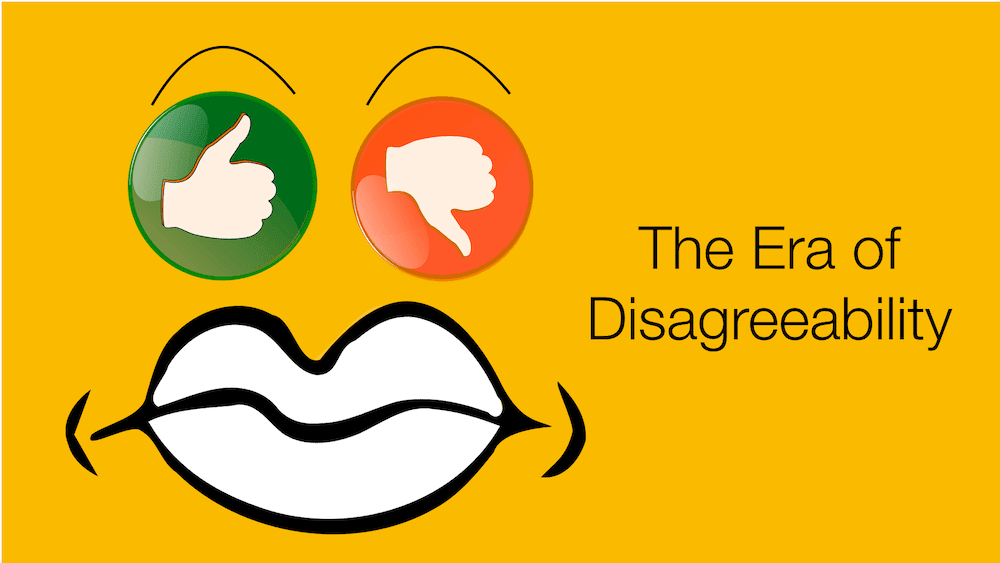I listened to a recent (and rather epic 4-hour-long) Joe Rogan podcast with his frequent guest and brilliant mathematician, Eric Weinstein, who proposed that we are in the Era of Disagreeability. Paraphrasing him, it’s about not being easily swayed from your convictions, and sticking to your own principles. According to Weinstein, it’s the best way to “avoid getting swept up in the madness of others.”
Why might it indeed be the Era of Disagreeability?
 Considering the divisive nature of most conversations, you might think it’s a candid description of what’s going on. It certainly seems right to say that things are very disagreeable out there. But, when I took stock of Weinstein’s statement and connected the dots with a few other thoughts I have had, it started to make a lot more sense to me. And, like with anything in these complex times, there needs to be subtlety in the execution. These are challenging times and messy issues. To cut through the clutter will require some bravery.
Considering the divisive nature of most conversations, you might think it’s a candid description of what’s going on. It certainly seems right to say that things are very disagreeable out there. But, when I took stock of Weinstein’s statement and connected the dots with a few other thoughts I have had, it started to make a lot more sense to me. And, like with anything in these complex times, there needs to be subtlety in the execution. These are challenging times and messy issues. To cut through the clutter will require some bravery.
Brave Marketing
For example, looking through the prism of a marketer, as Seth Godin points out sharply in his new book, This is Marketing, brands need to stand for something and appeal to some specific group. You can’t and shouldn’t want to appeal to too many people. That means you have to be prepared to piss off a certain number. Be prepared to be disagreeable (in the eyes of some!). Naturally, this is not give us license to create provocative messages for the sake of alarming or pissing people off. It’s about being more aware of what you stand for and what you are trying to achieve. I have written before about the notion of brands being emboldened to take sides on certain political issues (see also my podcast with Latia Curry).
Bridging the Gap
It might seem counter intuitive, but, in this divisive era, I think we do need to up our own disagreeability. I think of this in two ways and, perhaps, not in the ways you might initially think:
- As Weinstein establishes above, and I agree with him, we need to know what we stand for and what we’re prepared to stand up against … which can create a certain level of discomfort. On this count, we need to improve our self-awareness, re-assess our ethics, and be more accountable to our words and actions. This carries the risk that we may be perceived as being disagreeable.
 From whichever side of the spectrum you stand, we need to have the courage to call out when members on “your” side do something that is egregious. This may make you appear disagreeable to your own ‘teammates’. And, certainly, it’s not the easy road. I’d like to salute the great podcast Femsplainers, hosted by Christine Sommers and Danielle Crittenden, who aren’t afraid to cross the divide. Everyone ought to take a listen of their show!
From whichever side of the spectrum you stand, we need to have the courage to call out when members on “your” side do something that is egregious. This may make you appear disagreeable to your own ‘teammates’. And, certainly, it’s not the easy road. I’d like to salute the great podcast Femsplainers, hosted by Christine Sommers and Danielle Crittenden, who aren’t afraid to cross the divide. Everyone ought to take a listen of their show!
Why do I subscribe to this notion of the Era of Disagreeability? Because, if we want things to change, we can’t shy away from the tough conversations. The only way to bridge the gaps will be through discussion. Once we get into the conversation, however, that’s where we must bring our “A” game in terms of:
- civility
- listening skills
- not interrupting the other
- no expletives or rough words
- finding areas of agreement
- …
Inviting tough conversations can be exhausting. Fundamentally, it requires flexing our empathic muscles to better understand the other side, even possibly acquiescing with humility that the other side has some fair points. It’s just not possible that we all disagree on everything. After all, we need to remember we belong to a bigger community.
The question we need to ask ourselves: how are we going to leave this Earth a better place if we don’t all take responsibility?


 From whichever side of the spectrum you stand, we need to have the courage to call out when members on “your” side do something that is egregious. This may make you appear disagreeable to your own ‘teammates’. And, certainly, it’s not the easy road. I’d like to salute the great podcast
From whichever side of the spectrum you stand, we need to have the courage to call out when members on “your” side do something that is egregious. This may make you appear disagreeable to your own ‘teammates’. And, certainly, it’s not the easy road. I’d like to salute the great podcast 








